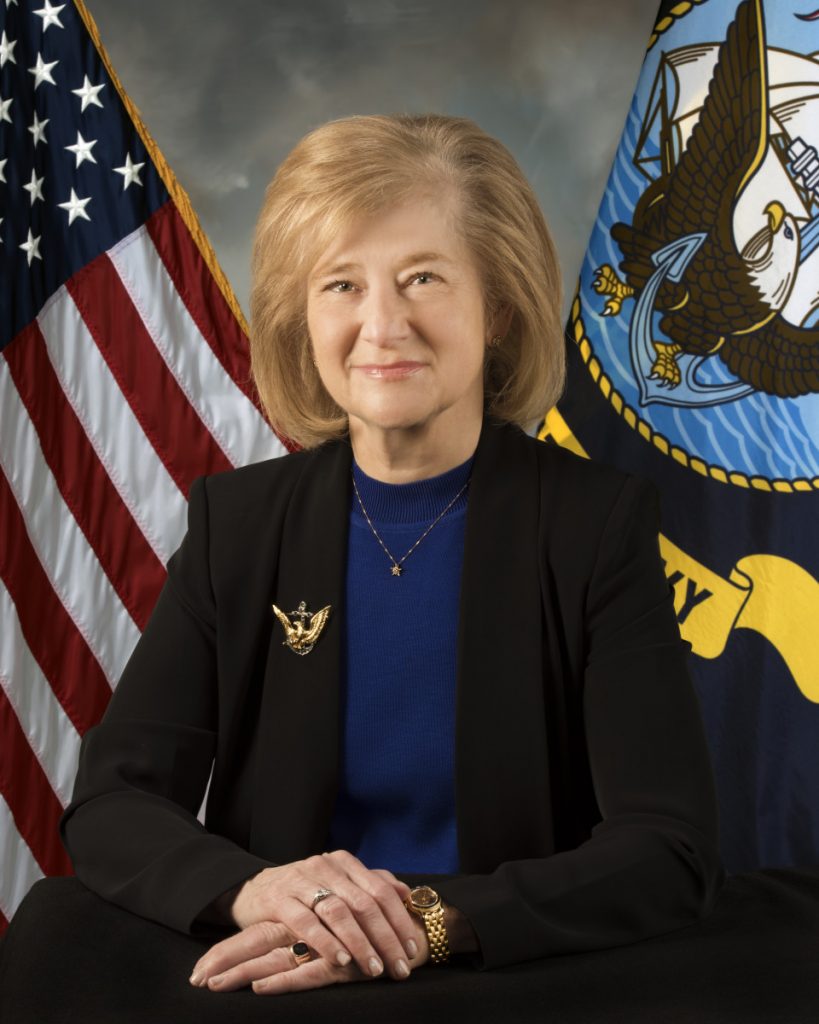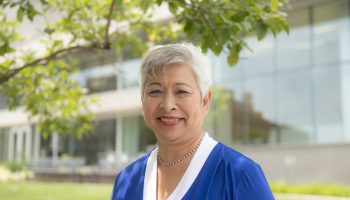Oceans and seas cover 70% of the Earth’s surface and account for 97% of its water, yet the U.S. National Oceanic and Atmospheric Administration estimates that 80% of the ocean has yet to be mapped, observed and explored. Except at the surface, it cannot even be seen without special technology.
The high seas — known informally as “international waters” — take up two-thirds of the ocean and half of the surface of the Earth. Beneath much of the high seas, the jurisdiction of the mineral-rich seabed is also international.
Whether under national or international jurisdiction, or a variant of the two, this enormous mass of free-flowing boundary-trespassing water — and virtually everything it brings with it — is of strategic interest and concern to coastal and landlocked nations across the world.
It is no wonder then, that coastal protection and effective sea power have historically been top U.S. military priorities.
At 2 p.m. Saturday, July 23, in the Hall of Philosophy, as part of the Chautauqua Women’s Club’s Contemporary Issues Forum, retired Vice Admiral Ann E. Rondeau, president of the Naval Postgraduate School, will deliver an address titled “Technological Leadership: Combining Research and Education for Advantage at Sea.” Her lecture is made possible by the bequest of Elie Haupt.
“We need to understand we’re entering a new cognitive age, and we need to make decisions differently, and a great deal of the time, much faster,” Rondeau said.
Accordingly, the Navy and Marine Corps must keep up with and adapt to the unprecedented national security challenges created by the fast pace of technological change. For America’s maritime advantage to be decisive, the leaders it develops must possess the cognitive know-how to ensure technological advance.
“I believe there are existential challenges,” Rondeau said. “I am committed to the development of knowledge, especially with exquisite speed and understanding. Our democracy is at risk internally and externally if we don’t make good decisions. … It’s a different world, … (one) that’s changing in ways unseen. … We have people with no governance, no boundaries.”
Rondeau said she knew when she was just 5 years old that she was good at leading.
“I liked leading teams doing things,” she said. “… (But) I’m not an extrovert or an introvert.”
At Eisenhower College in Seneca Falls, New York, the birthplace of women’s rights in the U.S., she majored in history and social science, won the Groben Award for Leadership, and was honored by the board of trustees as the most distinguished 1973 graduate. It was the late Warren Hickman — a longtime Chautauquan who attended Franklin D. Roosevelt’s “I Hate War” speech in the Amphitheater at age 13 and would later become a frequent Amp lecturer — who had developed a unique world studies program that became the basis for Eisenhower College. Hickman had served as part of Eisenhower’s staff at Supreme Headquarters Allied Expeditionary Force during World War II.
“I learned about Chautauqua when I was a sophomore in college — that was 1970-71 — from … Warren Hickman, who for 20 years tried to get me out to Chautauqua,” Rondeau said. “He was one of my main mentors. … He was a wonderful man, a gentleman, scholar, teacher and coach (who) led an active, dignified life. … It is my honor and privilege, and an extraordinary coming-around of my life (to be speaking at Chautauqua).”
There’s a good reason Rondeau hasn’t made it to Chautauqua before now; her work has kept her in near constant motion elsewhere. Although Title IX of the Education Amendments of 1972, which prohibited sex-based discrimination in schools or other education programs, received federal funding and was in its infancy when Rondeau graduated from Eisenhower, she said that it eventually benefited her.
“Title IX changed girls’ futures,” she said. “You didn’t have to be an athlete to have it affect you. It was also in the military. When I came in, Title IX … wasn’t changing (things), yet it had to be passed to change structural foundations for women. … I came in when there wasn’t the opportunity to do team sports or be in combat. I came in at the very end of that. Things changed over time.”
When she entered the Navy near the end of the Vietnam War, Rondeau said that the women’s uniforms weren’t khaki like the men’s; hers was light blue seersucker. There was no allowance for the positive effects that uniforms have on “identity, meaning, belonging.”
After completing Officer Candidate School in 1974, Rondeau was commissioned as a Naval officer and served as commander of Pacific Fleet Navy Communications for two years. President Richard Nixon had ended the military draft in January 1973, when the war was nearly over, and the military became an all-volunteer force.

“A lot of men were not coming in,” Rondeau said. “… Almost every year was different. I came in, in a fleet communications job in Hawaii. I had no experience, but they put me in because they wanted to put women in various jobs. I was the first woman many times, and other women came in behind me. So I had the opportunity, and pretty quickly they did, too.”
With the help of male bosses, Rondeau said she “looked for loopholes.” This led to training in merchant marine ships and combat ships at sea. After she became the second woman, and the first in Patrol Squadron Fifty, assigned to operations intelligence with submarine warfare, she said she was sent to Georgetown University — wearing a khaki uniform. There, she earned her master’s in comparative government in 1982.
“I now had a better sense of belonging,” Rondeau said.
Because she has a broad base of interests, from history to science, her naval expertise is very diverse.
From 1982 to 2001, Rondeau progressed from NATO-Europe strategy and policy, to the Pentagon, to a White House Fellowship under the Attorney General, to Fast Sealift Squadron One, to the Military Sealift Command in New Orleans, to the Naval Operations Executive Panel, to Naval Support Activity in Italy, to the Chief of Naval Operations Strategic Studies Group in Rhode Island, back to the Pentagon, then to Naval Support Activity Mid-South in Tennessee, and finally to managing and overseeing all of the U.S. Pacific Fleet’s shore installations.
“Along the way there were markers, navigation points, (like being) the first woman,” she said “Boy, did I study hard, and I worked really hard. When you’re the first and only, you stand out, and I wanted to stand out good. … I was curious, and I sought to be proficient. I wasn’t arrogant; I thought I could always learn more.”
Spending between one and three years per post from 2001 to 2012, she advanced from overseeing naval service training in the Great Lakes, to commanding the Naval Professional Development Command in Virginia, to directing all Navy staff and supporting agencies at the Pentagon as a vice admiral, to serving as deputy combatant commander for the U.S. Transportation Command in Illinois, to becoming president of the National Defense University in Washington in 2009.
Rondeau won three Distinguished Service Medals, a Defense Superior Service Medal, four Legion of Merits awards, five Meritorious Service Medals and three Navy Commendation Medals. She also earned her Doctor of Education in education, research and public policy at Northern Illinois University “over a nine-year period with five moves and jobs, and four different dissertation chairs; but I got it done by 2010.” Retiring from the Navy in 2012, Rondeau went to IBM as a full-time consultant for The Watson Group, where she learned about artificial intelligence, business risk versus military risk, business as a potential provider to the government, and how IBM operates.
“I grew up about 10 miles south of Poughkeepsie,” she said. “(There were) huge IBM labs that fed that region. … Then they closed down, and people felt it. IBM is a really interesting study. In 1999, it almost went broke. It shed a lot of real estate and had to change because of the environment. The military is kind of the same way. You have to learn from your environment. By living near and working in IBM, I learned how much (that means) for survival.”
When she learned that her mother was terminally ill, she left IBM in 2014 and moved to the Midwest. While she was in Wisconsin, she said she was asked to put her name in for the presidency of the College of DuPage, Illinois’ largest community college, located in a northwest suburb of Chicago.
“DuPage is very well-heeled,” Rondeau said. “Half of the students in nursing were empty-nester women. They had been mothers, and now they had a skill set.”
Although she had thought DuPage would be the culmination of her career, she said she was asked to apply for both the presidency of the Naval Postgraduate School, and of a distinguished university in the northeast.
“A friend said, ‘You could get both, but which is your destiny?’ ” Rondeau said. “… I returned to a (very) different Navy. … At NPS, these are 32 year olds coming from a conventional context, not high school or college students. I have to (lead) well and effectively when there’s enormous buffeting against it.”
On Saturday, Rondeau will speak about the strategic challenge of maintaining a decisive maritime advantage, “and how the unique mission of NPS contributes to technological leadership and protection of the seas, which is the foundation of economic growth and security for the U.S., as well as our allies and partners throughout the world.”
Service as a guest speaker by the Naval Postgraduate School President at the Contemporary Issues Forum does not constitute an endorsement of Chautauqua Women’s Club, its services, or activities by the Department of Defense or any of its components.




